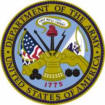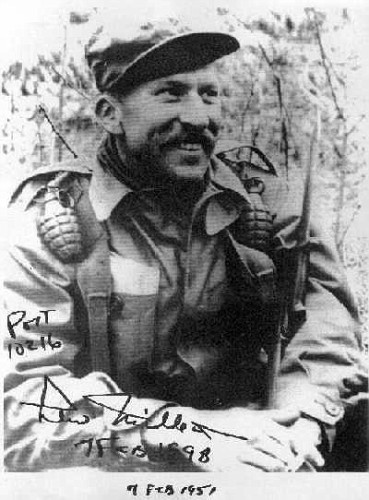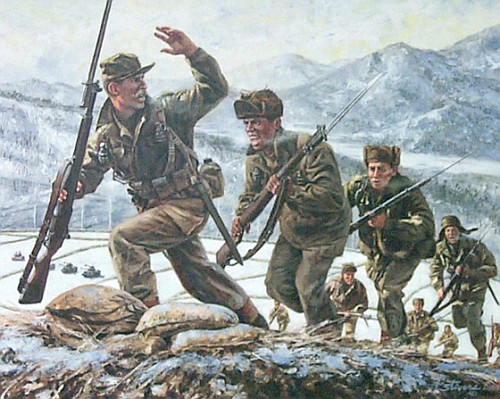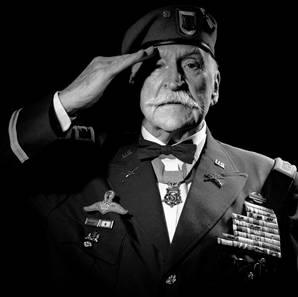| Our Troops Rock! Thank you for all you do! |
| For the freedom you enjoyed yesterday... Thank the Veterans who served in The United States Armed Forces. |
| Looking forward to tomorrow's freedom? Support The United States Armed Forces Today! |
Early life Millett was born on December 15, 1920, in Mechanic Falls, Maine. He grew up in South Dartmouth, Massachusetts, having moved there with his mother after his parents divorced and his mother remarried. His great-grandfather had served in the American Civil War and an uncle fought in World War I with the 101st Field Artillery Regiment of the Massachusetts Army National Guard. World War II While still attending high school in Dartmouth, he enlisted in the Massachusetts National Guard and in 1938 joined his uncle's old regiment, the 101st Field Artillery. In 1940, he joined in the United States Army Air Corps and entered gunnery school. When it appeared that the U.S. would not enter World War II, Millett, eager to fight, deserted in mid-1941. With a friend who had received a bad conduct discharge from the U.S. Marine Corps, Millett hitchhiked to Canada and enlisted in the Canadian Army. Assigned to the Royal Regiment of Canadian Artillery, he was sent to the United Kingdom, where he served as an anti-aircraft radar operator in Assigned to the 27th Armored Field Artillery Regiment, 1st Armored Division, Millett served in Tunisia as an anti-tank gunner. During an engagement there, he drove a burning ammunition-filled half-track away from Allied soldiers, jumping to safety just before it exploded. For this action, he was awarded the U.S. military's third-highest decoration, the Silver Star. He later shot down a Messerschmitt Me-109 fighter plane using half-track mounted machine guns. Millett, by then a sergeant, next took part in the Allied invasion of Italy at Salerno and the subsequent Battle of Anzio. It was at this time that the U.S. Army discovered Millet's 1941 desertion; he was court-martialed, convicted, ordered to pay a $52 fine, and stripped of his leave privileges. Only weeks later, he was given a battlefield commission to second lieutenant. Korean War After World War II, Millett attended Bates College in Lewiston, Maine, for three years before being called up to serve in Korea. Over a decade later, in the 1960s, he earned a bachelor's degree from Park College (now known as Park University) in Missouri. By February 7, 1951, Millett was serving in Korea as a captain and commander of Company E of the 27th Infantry Regiment. On that day, near Soam-Ni, he led his company in an assault on an enemy position atop Hill 180. When one platoon became pinned down by heavy fire, Millett took another platoon forward, joined the two groups, and led them up the hill. Wielding his bayonet and throwing hand grenades, Millett yelled encouragement to his soldiers throughout the hand to hand fight. Upon reaching the top of the hill, his men stormed the enemy position and forced the opposing soldiers to withdraw. Although wounded in the shin by grenade fragments, Millett refused to be evacuated until the position was secured. Vietnam War Millett retired from the military in 1973 at the rank of colonel. He later stated that he retired because he felt the U.S. had "quit" in Vietnam. Later years and family After his military career, Millett worked as a deputy sheriff in Trenton, Tennessee. He eventually moved to Idyllwild, California, where he would remain for the rest of his life. He regularly appeared at events celebrating veterans, both in the Riverside County area and elsewhere around the country. Millett died of congestive heart failure on November 14, 2009, one month short of his 89th birthday. He died at the Jerry L. Pettis Memorial VA Medical Center in Loma Linda, California, after being hospitalized four days earlier. He had experienced various health problems over the last few years of his life, including diabetes. His funeral will be held on December 5 at Riverside National Cemetery in Riverside, California. Awards and honors Millett's military awards include the Medal of Honor, Distinguished Service Cross, Silver Star, two Legion of Merits, three Bronze Stars, four Purple Hearts, and three Air Medals. At Osan Air Base in South Korea, "Millett Road" is named after Colonel Millett running up Hill 180, the hill where he led the legendary bayonet charge. In 2009, a park in San Jacinto, California, was named in honor of Millett. Capt. Millett, Company E, distinguished himself by conspicuous gallantry and intrepidity above and beyond the call of duty in action. While personally leading his company in an attack against a strongly held position he noted that the 1st Platoon was pinned down by small-arms, automatic, and antitank fire. Capt. Millett ordered the 3d Platoon forward, placed himself at the head of the 2 platoons, and, with fixed bayonet, led the assault up the fire-swept hill. In the fierce charge Capt. Millett bayoneted 2 enemy soldiers and boldly continued on, throwing grenades, clubbing and bayoneting the enemy, while urging his men forward by shouting encouragement. Despite vicious opposing fire, the whirlwind hand-to-hand assault carried to the crest of the hill. His dauntless leadership and personal courage so inspired his men that they stormed into the hostile position and used their bayonets with such lethal effect that the enemy fled in wild disorder. During this fierce onslaught Capt. Millett was wounded by grenade fragments but refused evacuation until the objective was taken and firmly secured. The superb leadership, conspicuous courage, and consummate devotion to duty demonstrated by Capt. Millett were directly responsible for the successful accomplishment of a hazardous mission and reflect the highest credit on himself and the heroic traditions of the military service. Thank you sir, for your service and sacrifice for our country! Please remember the Canteen is here to honor, support and entertain our troops and their families. This is a politics-free zone! Thanks for helping us in our mission! ~ Hall of Heroes ~ Lewis L. Millett
Story from this website. 




Lewis Lee Millett, Sr. (December 15, 1920 – November 14, 2009) was a United States Army officer who was awarded the Medal of Honor during the Korean War for leading the last major American bayonet charge.  London during the Blitz. By the time he arrived in the United Kingdom, the U.S. had entered the war; Millett transferred to the U.S. Army in 1942.
London during the Blitz. By the time he arrived in the United Kingdom, the U.S. had entered the war; Millett transferred to the U.S. Army in 1942.
For his leadership during the assault, Millett was awarded the Medal of Honor. The medal was formally presented to him by President Harry S. Truman in July 1951. He was also awarded the Army's second-highest decoration, the Distinguished Service Cross, for leading another bayonet charge in the same month.
After the Korean War, Millett attended Ranger School at Fort Benning, Georgia. He was assigned to the 101st Airborne Division as an intelligence officer and later served in Vietnam as a military advisor to the controversial Phoenix Program, which aimed to root out and kill Viet Cong sympathizers. He also helped found a "Recondo" (reconnaissance-commando) school to train small units for service in Vietnam. In the mid-1960s, he commanded the Army Security Agency training center at Fort Devens, Massachusetts.Millett's official Medal of Honor citation reads:

 By Free Republic | Created at 2025-01-06 01:23:58 | Updated at 2025-01-10 08:53:07
4 days ago
By Free Republic | Created at 2025-01-06 01:23:58 | Updated at 2025-01-10 08:53:07
4 days ago








